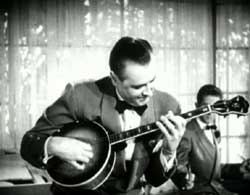 Covering Tommy Dorsey's 1937 hit, Larry Clinton & His Orchestra perform the titular big-band classic in the soundie Dipsy Doodle (1943). This number was often covered, notably by Ella Fitzgerald with Chick Webb's orchestra, & even by Bill Haley & the Comets, besides being goofed up by Homer & Jethro.
Covering Tommy Dorsey's 1937 hit, Larry Clinton & His Orchestra perform the titular big-band classic in the soundie Dipsy Doodle (1943). This number was often covered, notably by Ella Fitzgerald with Chick Webb's orchestra, & even by Bill Haley & the Comets, besides being goofed up by Homer & Jethro.
But none more than Larry's band deserved to do a version (in fact, he did several versions), since he had written it. Larry had been a composer & arranger for both of the Dorsey brothers, & even arranged for Louis Armstrong.
The irony is that when he formed his own band in 1938, he was not allowed officially to record "Dipsy Doodle" for release as a 78, because his contract with RCA did not want his releases to conflict with Tommy Dorsey who had already made the song a hit for RCA.
Other bands at other studios could re-record it, but not its composer! Even so, Larry always opened his live shows with the popular diddy, & he performed it more than once on film.
His own band was not long-lived. He founded it in the summer of 1938 but in 1942 he decided he had to enlist into the war, & that was the end of his orchestra. A handful of soundies are just about the last thing he did before taking off for the Air Force. By the time his soundies were released in 1943, he was already in the armed forces.
He made these soundies probably within a week in 1941, for a company called Cavalcade Pictures, backed by Phonovue Jukebox, a competitor for Panoram jukeboxes. The Phonovue jukebox was much smaller than a Panoram.
This unique arrangement "Dipsy Doodle" uses lots of brass -- slide trumbones & trumpets dominating (including Larry himself with trumbone), but good work from the reeds & a slap bass too.
There's an amazing banjo solo that sounds very guitar-like, nothing folksy or banjoish about it. It's followed by sax solo & two trumbone solos, but it's that banjo that stands out.
Larry had also written some very silly words to go with the bouncy-catchy tune, but here his band does it as an instrumental. Instead of a vocal we get that surprising banjo performance. This is genuinely one of the great soundies.
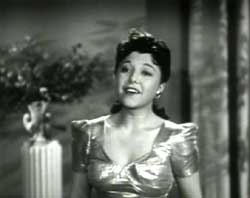 A #1 hit for Larry Clinton & His Orchestra, the band covers themselves with an arrangement unique to the soundie Deep Purple (1943). Versatile Larry leads the band & plays clarinet.
A #1 hit for Larry Clinton & His Orchestra, the band covers themselves with an arrangement unique to the soundie Deep Purple (1943). Versatile Larry leads the band & plays clarinet.
Composed in 1934 by Peter de Rose, with lyrics added in 1939 by Mitchell Parish, the lyrics are given expression in this soundie by Peggy Mann:
"When the deep purple falls/ Over sleepy garden walls/ And the stars begin to flicker in the sky/ Through the mist of a memory/ You wander back to me/ Breathing my name with a sigh.
"In the still of the night/ Once again I hold you tight/ Though you're gone, your love lives on when moonlight beams/ And as long as my heart will beat/ Lover we'll always meet/ Here in my deep purple dreams."
Peggy, the last of vocalists with the Larry Clinton Orchestra, is beautiful to just see standing there singing. And she has a voice to match, & does the romantic number wild justice. She had big shoes to fill as it had been so beautifully performed for orchestra's 1938 recording with Bea Wain singing it, & Bea was a hard act to live up to.
The arrangement is really for the vocalist, too, & Larry is strictly being a background band on this one, no pyrotechnics or instrumental solos to detract from Peggy.
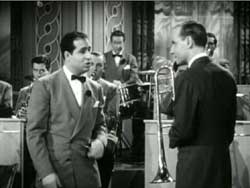 For Watcha Know Joe (1943) has a brief visual prelude which shows Larry Clinton & his orchestra on a Phonovue jukebox, which had a shorter wider picture than a Panoram. Behind the Phonovue is a jitterbug couple.
For Watcha Know Joe (1943) has a brief visual prelude which shows Larry Clinton & his orchestra on a Phonovue jukebox, which had a shorter wider picture than a Panoram. Behind the Phonovue is a jitterbug couple.
The scene then cuts to Larry getting the orchestra started, assisting on his own trumbone, but still mainly conducting & not soloing. Several band members stand & begin the song as a call & response, with Butch Stone the respondent:
"Watcha know Joe?/ I don't know nothin'/ Watcha know Joe?/ Tell me somethin'/ Whatcha know Joe?/ Ain't connivin', I ain't jivin', I don't know..."
This cute little novelty was written by Victor Young & recorded by many leading bands such as Tommy Dorsey, Charlie Barnett, Glenn Miller, & Woody Herman orchestras. Even Fats Waller did it, & the King Cole Trio.
Butch is as good as any of his great contemporaries singing the upbeat song about feeling lousy about oneself as a know-nothin' dummy. His little-boy body language has a hipster edge to it. He tended to be a comedic singer but this is no more a jest than something by, oh, Louis Jordan who could be comedic without making an amusing song only a joke.
When the Larry Clinton Orchestra disbanded (the year before this soundie was released), Butch went off to join the Les Brown orchestra, & stayed with it for decades to come. Even when he was in his eighties & legally blind, he'd dance & mug & sing & win roars of appreciation from audiences. See also the review of Butch singing For Time Will Take Care of Everything (1951) with the Les Brown Orchestra.
Watcha Know Joe is a high-end soundie for entertainment, & after an instrumental break, we even get to hear Larry's voice as he does the call & reply with Butch without the orchestra chorasing.
In rap-rhyme Larry & Butch trade off on such lines as "Isn't there something we can do to get you back in the groove?/ Well, start the band jumpin' man, you'll see me move." When a sax solo begins, Butch leaps up, dancing, then does the closing lyrics about feeling good again.
It's a minor aside, but when the title card isn't missing from this soundie, the spelling is as given here, though it was probably a mistake for Whatcha Know Joe including the "h."
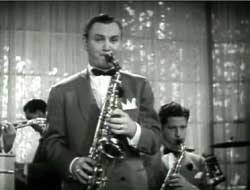 Under the influence of Duke Ellington's "jungle" period, many white bands tried to recapture the Duke's jungle exotica, & it could sometimes be cloying.
Under the influence of Duke Ellington's "jungle" period, many white bands tried to recapture the Duke's jungle exotica, & it could sometimes be cloying.
But Larry Clinton & His Orchestra were too good, too refined, they just weren't at all apt to do an embarrassing arrangement with jungle stereotypes.
They take up the promise of a jungle tune in Chant of the Jungle (1943) but fortunately without the stereotypical tomtom. Forgoing lyrics, it's a straight-out instrumental swing-jazz dance-tune.
Composed by Herb Brown & Arthur Freed at the end of the ragtime era, it was introduced in a transitional film as the silent era was dying & talkies arrived. That film was Untamed (1929) with Joan Crawford singing & dancing the number. Many bands would cover it in the next couple decades, & about the same time Larry Clinton's orchestra was filmed for this soundie, Cab Calloway released a new version.
For Chant of the Jungle, Larry Clinton isn't really conducting the band but gazing right into the camera & playing his slide trumbone directly into the camera too. He doesn't personally solo, however, leaving that for his best sax man.
For my tastes this is the least of Clinton's soundies, as the number is just loud & brash. But we do get another banjo solo that I find especially remarkable for sounding closer to Les Paul on guitar than like the expected rattly rinky-tinky banjo. In lieu of a vocalist, Larry gives his banjoist an extended solo, & I must apologize for not yet figuring out who this amazing banjoist is.
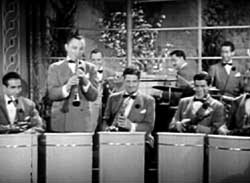 Larry & his orchestra are really too good to be playing junk like John Phillips Souza's Semper Fidelis (1943), but maybe there was call for it in 1943.
Larry & his orchestra are really too good to be playing junk like John Phillips Souza's Semper Fidelis (1943), but maybe there was call for it in 1943.
As the number begins, it is played the way Souza would've wanted it, all the brass going full blast & obnoxiously loud.
After about twenty seconds of the Souza arrangement of the circus parade march, it bursts into a swing-jazz arrangement so that it's suddenly clear what Larry Clinton thought he was up to.
Alas, all he has really done is make switch to a patriotic march for the war & it's still pretty much the worst of his soundies.
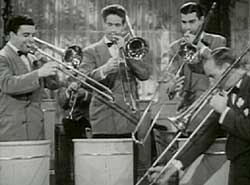 For a moment it seems he's not back on track with the beginning of Smiles (1943). For a moment it seems he's not back on track with the beginning of Smiles (1943).
It begins just the instrumentation of the Callahan & Roberts composition from the ragtime era. By the time Larry Clinton got round to performing this one, it was quite a chestnut.
At first I didn't feel Larry's orchestra was doing anything with it to justify the umpteenth version. That is, until Butch Stone comes out, then I no longer cared that it's a chestnut, because I like this guy no matter what he sings.
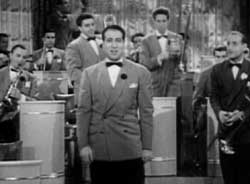 The arrangement begins with a big sax solo. Larry joins in with his trumbone but as usual isn't soloing, just playing along with his band. Halfway through Butch comes out to deliver the familiar lyrics. The arrangement begins with a big sax solo. Larry joins in with his trumbone but as usual isn't soloing, just playing along with his band. Halfway through Butch comes out to deliver the familiar lyrics.
What had been a bit of a dull & serious instrumental is suddenly camped up with the band's assistance turning Smile into a call & response number.
Butch always preferred camp performances but once again, I don't care, he's just fun. With the extra "response" lyrics added, it runs in part:
"There are smiles (silly old smiles) that make us happy (happy all day)/ There are smiles (smiley old smiles) that make us blue (and you see)/ There are smiles that steal away the teardrops/ Just as the sun can steal away the dew..."
Butch mostly stands swinging his arms through this song but at the end he does a bit of a twirl & a silly two-step of farewell.
copyright © by Paghat the Ratgirl
|
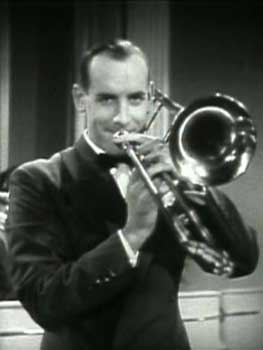






 The arrangement begins with a big sax solo. Larry joins in with his trumbone but as usual isn't soloing, just playing along with his band. Halfway through Butch comes out to deliver the familiar lyrics.
The arrangement begins with a big sax solo. Larry joins in with his trumbone but as usual isn't soloing, just playing along with his band. Halfway through Butch comes out to deliver the familiar lyrics.